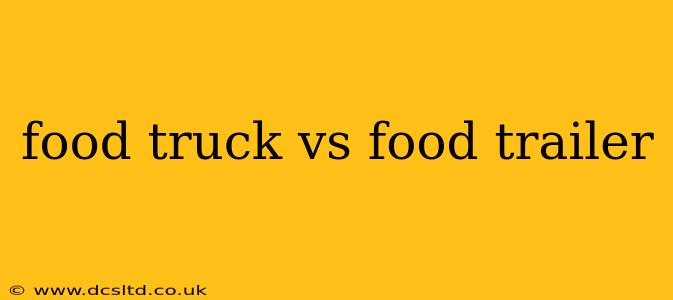The vibrant world of mobile food vending offers exciting opportunities, but choosing between a food truck and a food trailer is a crucial first step. Both options provide mobility and flexibility, but they differ significantly in cost, functionality, and overall suitability for various business models. This comprehensive guide will delve into the key distinctions to help you make the informed decision that best aligns with your culinary vision and financial resources.
What are the Key Differences Between a Food Truck and a Food Trailer?
The most apparent difference lies in their structure and maneuverability. Food trucks are typically built on a chassis of a commercial vehicle, resembling a large van or box truck. This provides inherent mobility and allows for driving directly to events and locations. Food trailers, on the other hand, are towed behind a vehicle, requiring a separate towing vehicle for transport. This added step impacts setup time and requires a towing license.
What are the Pros and Cons of a Food Truck?
Pros of a Food Truck:
- Mobility: Drive directly to your location, eliminating towing hassles.
- Branding Opportunity: A larger canvas for eye-catching branding and designs.
- Storage: Often offers more integrated storage space.
- Self-Contained: Typically includes built-in utilities, reducing reliance on external hookups.
Cons of a Food Truck:
- Higher Initial Cost: Significantly more expensive than food trailers.
- Operating Costs: Higher fuel consumption and maintenance expenses.
- Driving Restrictions: Size and weight restrictions may limit access to certain areas.
- Parking: Finding suitable parking spaces can be challenging in some locations.
What are the Pros and Cons of a Food Trailer?
Pros of a Food Trailer:
- Lower Initial Cost: More affordable entry point for new businesses.
- Customization: Wide range of sizes and configurations available.
- Easy Towing: Relatively easy to tow with most vehicles (depending on size and weight).
- Flexibility in Size and Design: You can choose a trailer that precisely fits your needs.
Cons of a Food Trailer:
- Requires a Towing Vehicle: An additional vehicle is necessary for transport.
- Setup Time: Requires more time to set up and break down at each location.
- Utility Hookups: May require external hookups for water, power, and sewer.
- Limited Branding Space: Smaller surface area for branding compared to a food truck.
How Much Does a Food Truck Cost vs. a Food Trailer?
The cost of both varies greatly depending on size, features, and customization. Generally, food trucks have a much higher initial investment, ranging from $50,000 to well over $100,000. Food trailers are typically less expensive, starting around $10,000 and potentially reaching $50,000 depending on specifications. Remember to factor in the cost of equipment, permits, and licenses.
Which is Easier to Get Permits and Licenses For?
The permitting and licensing process is largely location-specific and depends on factors such as health codes, zoning regulations, and business licenses. Both food trucks and trailers require similar permits and licenses, but the specific requirements might differ based on your location. Research your local regulations thoroughly before making a purchase.
Which is Better for a Specific Location?
The suitability of a food truck or trailer heavily depends on the intended operating locations. Food trucks are ideal for events and areas with limited parking restrictions. Food trailers are well-suited for events with designated food vendor areas or locations where parking space for a truck is scarce.
What About Maintenance and Repairs?
Both food trucks and trailers require regular maintenance. Food trucks, being complex vehicles, tend to have higher maintenance costs and potential repair complexities. Food trailers generally have less complex systems, potentially leading to lower maintenance expenses.
Conclusion: Choosing the Right Mobile Food Unit
The decision between a food truck and a food trailer is a significant one, deeply impacting your operational efficiency, initial investment, and overall business strategy. Carefully weigh the advantages and disadvantages based on your specific business model, budget, intended operating locations, and long-term goals. Thorough research and planning are vital to ensure your mobile food venture is a resounding success.
